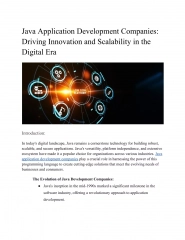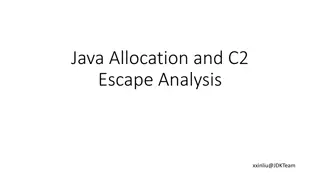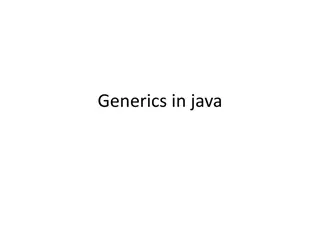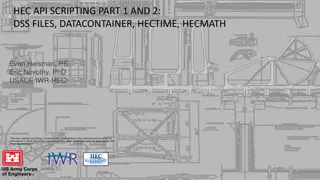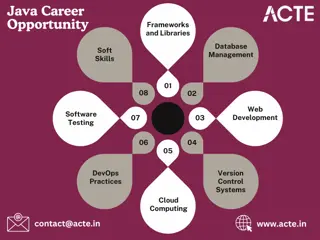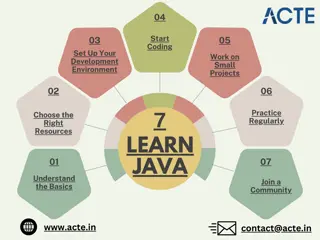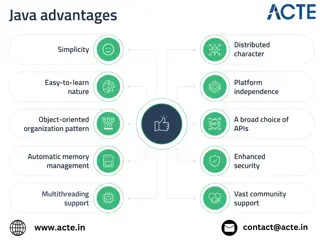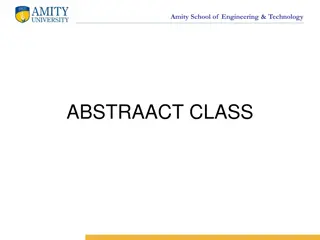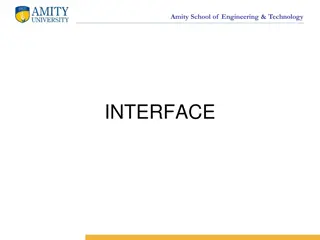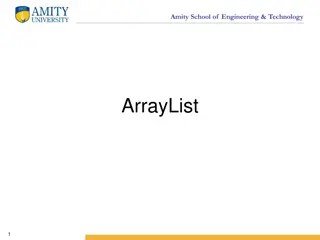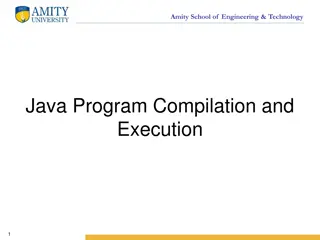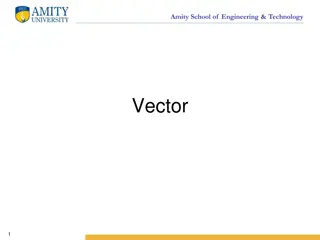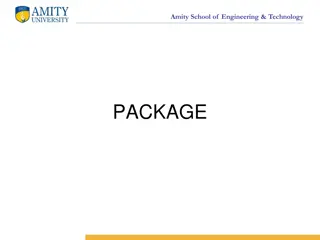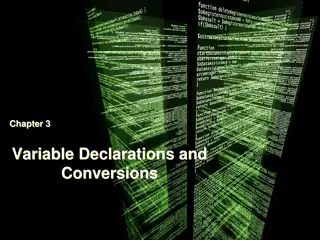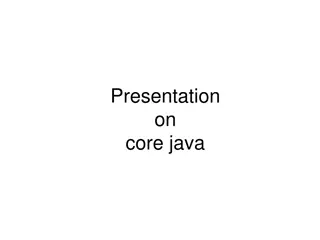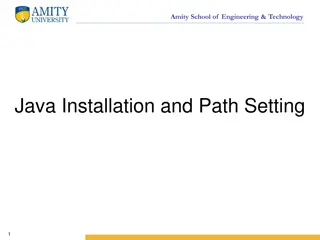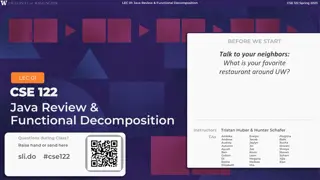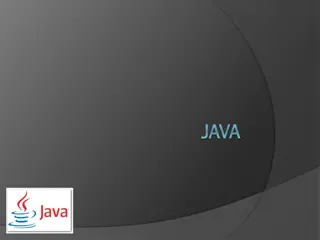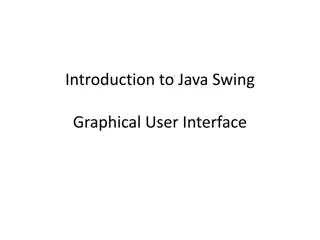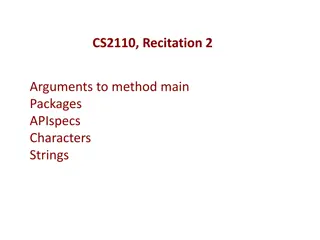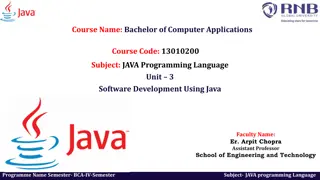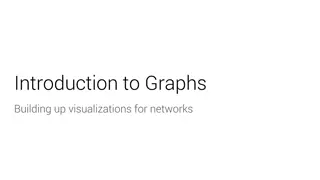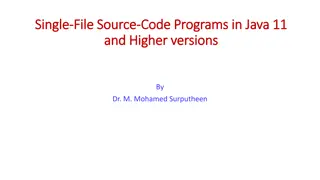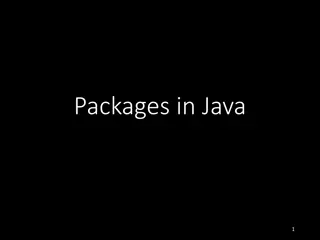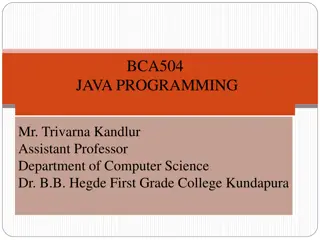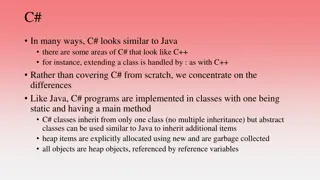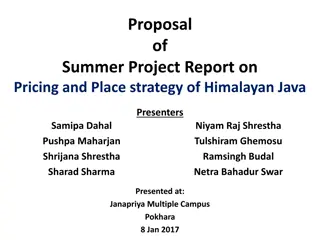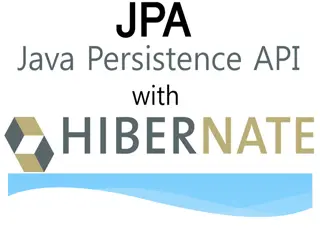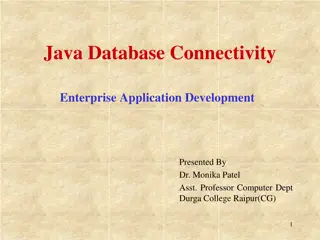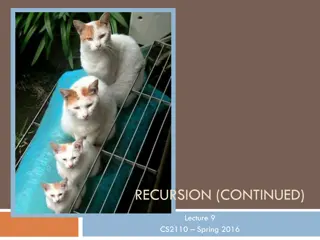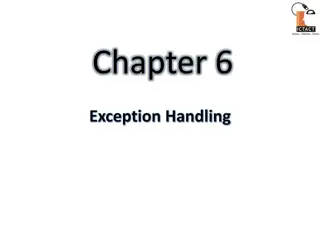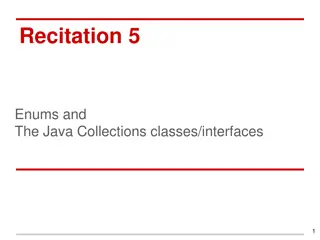Java application development company (1)
In today's digital landscape, Java remains a cornerstone technology for building robust, scalable, and secure applications. Java's versatility, platform independence, and extensive ecosystem have made it a popular choice for organizations across various industries. Java application development compa
2 views • 4 slides
Variables, Assignment,and Data Types
Explore key Java programming concepts such as variables, assignment, data types, Java keywords, printing strings, pseudocode, escape sequences, and more. These fundamental topics are essential for building a strong foundation in Java programming. Dive into code examples and explanations to enhance y
7 views • 13 slides
Java Allocation and C2
Java object allocation and escape analysis play crucial roles in memory management and performance optimization within the Java Virtual Machine (JVM). This comprehensive overview covers topics such as object vs. scalar allocation, object allocation mechanisms, hotspot escape analysis, ideal and conn
2 views • 22 slides
Understanding Generics in Java
Generics in Java allow for parameterized types, enabling the use of different data types in classes, interfaces, and methods. By creating generic entities, such as classes that work with various data types, Java programmers can write more flexible and reusable code. This concept is demonstrated thro
0 views • 16 slides
Overview of HEC API Scripting Part 1 and 2: DSS Files, DataContainer, HecTime, HecMath
This report delves into the HEC API scripting involving DSS files, DataContainer, HecTime, and HecMath. It covers important classes, accessing files, and the distinction between DataContainers and HecMath objects. Additionally, it compares Python and Java, highlighting their differences in interpret
2 views • 28 slides
Design Your Journey Enroll in the Best Full Stack Java Developer Course in Pune
Java is an extremely adaptable and robust programming language in the wide technology area. Ambitious developers can benefit greatly from having this ability due to its versatility and broad use across other disciplines. Pune has various options to launch your career if you're hoping to enter the fi
0 views • 3 slides
Design Your Journey Enroll in the Best Full Stack Java Developer Course in Pune
Java is an extremely adaptable and robust programming language in the wide technology area. Ambitious developers can benefit greatly from having this ability due to its versatility and broad use across other disciplines. Pune has various options to launch your career if you're hoping to enter the fi
1 views • 3 slides
Enhancing Your Java Skills: Key Areas to Boost Your Career Opportunities
Java is a cornerstone of modern software development, known for its versatility and robustness. However, to maximize your career potential and stay competitive in today\u2019s tech industry, it\u2019s beneficial to complement your Java skills with ad
1 views • 1 slides
Your Complete Guide to Learning Java from Scratch
Java is one of the most popular and versatile programming languages in the world. Whether you\u2019re aiming to become a professional developer or simply looking to enhance your programming skills, learning Java from scratch can be a rewarding experi
1 views • 1 slides
Understanding Java: The Backbone of Cross-Platform Development
Java stands as a cornerstone in the realm of programming languages, revered for its versatility and robustness. Enrolling in a Java Course in Pune significantly enhances one\u2019s ability to leverage Java\u2019s capabilities effectively. Understandi
1 views • 1 slides
Understanding Abstract Classes in C++ and Java
Abstract classes play a crucial role in C++ and Java programming. In C++, a class with at least one pure virtual function becomes abstract, while in Java, the 'abstract' keyword is used to define an abstract class. This article discusses the concept of abstract classes, their key characteristics, ex
0 views • 33 slides
Understanding Java Interfaces in Amity School of Engineering & Technology
Java interfaces are a key concept in object-oriented programming that allows for achieving multiple inheritance. The article discusses how Java interfaces work, their role in defining class behavior, and the differences between interfaces and classes. It also explains the syntax for declaring interf
2 views • 48 slides
Understanding Java ArrayList in Amity School of Engineering & Technology
Java ArrayList in Amity School of Engineering & Technology is a dynamic array used for storing elements without a size limit. It offers flexibility by allowing element addition and removal at any time. This type of array is part of the java.util package, similar to the Vector in C++. The ArrayList c
0 views • 18 slides
Amity School of Engineering & Technology - Java Program Compilation and Execution
Explore the steps for compiling and running a Java program at Amity School of Engineering & Technology. Learn about the compilation and execution process, converting source code into byte code, creating directories, renaming files, and launching command prompts. Dive into the world of Java programmi
1 views • 19 slides
Understanding Amity School of Engineering & Technology Vectors in Java
Amity School of Engineering & Technology Vectors provide a flexible way to manage dynamic arrays in Java programming. With capabilities to store objects of any type and accommodate dynamic resizing, these vectors offer optimized storage management through capacity and capacity increment settings. Co
0 views • 18 slides
Understanding Java Packages and Their Importance in Programming
An exploration of Java packages, their role in structuring code, organizing classes, and enhancing code reusability. Learn about built-in and user-defined packages, the Java API's package organization, and the different types of packages available in Java programming. Discover how packages help in c
2 views • 18 slides
Understanding Variable Declarations and Conversions in Java
Properly declaring variables in Java is essential before using them. This chapter covers different types of variable declarations, including class variables, instance variables, local variables, and parameter variables. It also explains the concept of type casting and the importance of explicitly de
1 views • 23 slides
Overview of Core Java Programming Language
Explore the fundamentals of Java, including its origin, usage across various platforms, key features, differences from C and C++, and the concept of Object-Oriented Programming. Discover the advantages and disadvantages of Java, making it a versatile language for software development.
1 views • 16 slides
Amity School of Engineering & Technology Java Installation Guide
In this detailed guide provided by Amity School of Engineering & Technology, learn how to install and set up Java on your system effectively. The step-by-step instructions cover downloading the Java installer, configuring the installation wizard, setting environmental variables, and more to ensure a
1 views • 19 slides
Java Review & Functional Decomposition in CSE 122 Spring 2023
Lecture 01 in CSE 122 covers Java review, functional decomposition, and code quality. Announcements include a Java review session, programming assignments, and reminders on Java syntax. The session encourages active participation through in-class activities using Slido polls. Students are also urged
0 views • 24 slides
Understanding Interactive Programs and Input/Output in Java
Interactive programs in Java allow users to input data through the console, which can be captured and used in the program. This involves using the Scanner class to read user input, and understanding common Scanner methods to process different types of input. Importing Java class libraries is essenti
2 views • 15 slides
Learning Swing with Java Foundation Classes (JFC) and Swing
Java Foundation Classes (JFC) and Swing provide a powerful set of tools for building graphical user interfaces in Java applications. This includes Swing GUI components, pluggable look-and-feel support, accessibility APIs, Java 2D graphics, and internationalization capabilities. By learning Swing wit
1 views • 11 slides
Understanding Java Swing for Building Graphical User Interfaces
Java Swing is a powerful framework for creating graphical user interface applications in Java. It provides a wide array of visual components such as JFrame, JComponent, and JPanel, enabling developers to build interactive and visually appealing applications easily. With Swing, developers can design
1 views • 25 slides
Java Application Development Basics
Learn how to create a Java application with a main method using Eclipse. Understand the concept of method parameters and how to provide arguments when running the application through Eclipse's Run Configurations feature. Explore the structure of packages in Java and the Java API.
0 views • 26 slides
Understanding Java Programming: BCA IV Semester Course Overview
This Bachelor of Computer Applications (BCA) course focuses on Java programming language fundamentals, object-oriented concepts, software development principles, and practical application skills. Students will learn to define Java program features, implement object-oriented features, work with array
0 views • 31 slides
Exploring Graphs: Visualizations and Representations in Java
Delve into the world of graphs with a focus on visualizations for networks and building up graph representations in Java. Explore different graph representations, adjacency lists, and key-value mappings, along with insights on storing and tracking data efficiently using Java data structures. Dive in
0 views • 12 slides
Understanding Single-File Source Code Programs in Java 11
Explore the concept of single-file source code programs in Java 11, where the entire program is contained within a single .java file without external dependencies. Learn how to compile and run these programs both before and after Java 11, and discover the new feature of executing Java programs direc
0 views • 11 slides
Understanding Scanner Class in Java: Reading User Input and Processing Files
The Scanner class in Java's java.util package allows reading input from the keyboard or files. It looks for tokens in the input, reads different types of values, and has methods like nextInt() and nextLine(). You can also read from files by creating a File object. Learn how to use Scanner to interac
0 views • 21 slides
Understanding Packages in Java: A Comprehensive Overview
Packages in Java play a crucial role in organizing and structuring code for efficient reuse and maintenance. They allow you to group related classes together, provide encapsulation, and facilitate code organization. This article dives into the basics of Java packages, advantages they offer, differen
0 views • 19 slides
Introduction to Java Programming: Basics and Applications
Java, developed by James Gosling, is a versatile object-oriented programming language used for mobile, desktop, web applications, servers, games, and more. It is renowned for its platform independence, popularity, ease of use, security, and strong community support. This subject delves into Java fun
0 views • 15 slides
Java Overview and Basics: Understanding the Fundamentals of Java Programming
Java is a versatile programming language known for its simplicity, security, portability, and high performance. Its history dates back to 1990 when the concept was first suggested, leading to the creation of Java in 1995 by James Gosling. Over the years, Java has evolved with various versions introd
0 views • 65 slides
Overview of Java Programming Language
Java is a versatile and powerful programming language created by James Gosling and others at Sun Microsystems in the 1990s. It aims for portability, reliability, safety, simplicity, and efficiency. With a strong focus on object-oriented programming, Java has evolved over the years with a rich histor
0 views • 33 slides
Mastering Generics in Effective Java: A Practical Guide for Java Programmers
Explore the world of generics in Java through Joshua Bloch's guidance in "Effective Java". Learn the importance of avoiding raw types, leveraging parameterized types for type safety, handling mixing of generic and raw types, and implementing wildcards for flexible and typesafe coding. Enhance your J
0 views • 30 slides
Differences Between C# and Java: A Comparative Overview
C# and Java share similarities in syntax and features, but there are key distinctions that set them apart. From class inheritance to memory management, this comparison highlights the unique aspects of C# programming. Explore how C# diverges from Java in terms of multiple inheritance, explicit heap a
0 views • 16 slides
Study on Pricing and Place Strategy of Himalayan Java Coffee: A Detailed Analysis
This report delves into the pricing and place strategies of Himalayan Java coffee, focusing on factors influencing coffee pricing and selection of outlet locations. The study aims to identify the target market, understand competitive dynamics, and analyze factors impacting coffee sales at Himalayan
0 views • 10 slides
Understanding Java Persistence API (JPA) for Data Management in Java Applications
Java Persistence API (JPA) is a specification that provides a framework for managing relational data in Java applications. It simplifies ORM solutions, offers vendor independence, and supports test-driven development with annotation-driven mapping.
0 views • 31 slides
Introduction to Java Database Connectivity (JDBC) in Enterprise Application Development
JDBC, or Java Database Connectivity, is a vital technology in enterprise application development that provides a standardized library for Java programs to connect to databases via SQL commands. It abstracts vendor-specific details, making connectivity to multiple databases seamless. JDBC API standar
0 views • 13 slides
Understanding Recursion in Java: CS2110 Lecture Overview
This content delves into the concept of recursion in the context of Java programming as discussed in the CS2110 Spring 2016 lecture series. It covers the basics of recursion, including base cases and how Java stack frames operate. The material also includes solutions to exception-handling problems a
0 views • 21 slides
Exception Handling in Java: Understanding Errors and Exceptions
Exception handling in Java is crucial for dealing with errors and exceptions that can occur during program execution. Errors and exceptions are conditions that disrupt the normal flow of a program, and understanding their differences is key to effective error management. This chapter covers the conc
0 views • 32 slides
Understanding Enums and Java Collections
Explore the concept of enums in Java programming, representing sets of constant values like suits, directions, days of the week, and planets. Learn about different ways to implement enums, their features, and how to use them effectively in your programs. Discover the advantages of enums over using c
0 views • 22 slides
